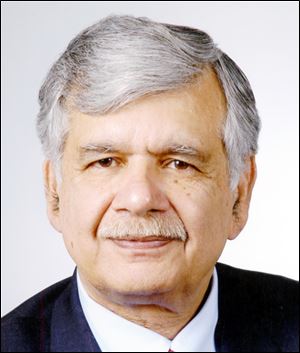
COMMENTARY
It takes a whole lot of people to ensure a language’s survival
8/29/2016
Hussain.
LONDON — Every summer some of my friends and I get together at some convenient place to spend time together, and we enjoy each other’s company and discuss ways to help keep an old language alive. This year our common purpose brought us to London.
The thing that binds us and compels us to go on our yearly sojourns is our mother tongue Hindko and by extension the city of Peshawar in northwest Pakistan, where, in not too distant a past, the Hindko-based culture flourished.
The man who holds the group together is a gracious gentleman by the name of Zahoor Sethi. He is the scion of one of the oldest and most prominent trading families from Peshawar. His ancestors traded with Central Asia and Russia over the Silk Route. However, the Bolshevik Revolution in 1917 and the hyperinflation that followed the upheaval turned their enormous ruble assets into worthless currency. Somehow they survived, and today Zahoor runs a string of successful private schools, colleges, and a university. He divides his time between Istanbul and Peshawar.
The others in the group include Shafqat Hussain (no relation), a retired general practitioner; Nasim Khwaja, a onetime owner of a warehousing business, and Safdar Khan, a real estate dealer. The three of them live in the greater London area. Of the remaining two, Yahia Qureshi is a retired educator from Toronto and Jahan Sadozai is a retired ground manager of Pakistan International Airline in New York City.
Though we all come from different walks of life, all of us have the passion to promote our mother tongue Hindko and make sure it takes its rightful place among the Pakistani languages, a place that has been denied to it for far too long.
Hindko was spoken in what is now the western part of Pakistan and eastern Afghanistan during the Gandhara period (1st to 8th century of the Common Era). While the written language changed through history, the spoken language survived. The language written on stone tablets dating back to the 2nd century of the Common Era resembles the present day Hindko.
About 50 years ago, well-to-do people stopped speaking Hindko with their children and switched to the dominant Urdu language. Some considered it to be a backward street language and compared it to the rough and tumble cockney dialect of London. It was once a highly refined language, but when the educated and the affluent started looking down at it, it took refuge on the street. When mothers stop singing lullabies in their babies’ ears in the native languages, the languages wither on the vine.
Things are getting better though. Thanks to the efforts of a handful of dedicated Hindko speakers in Peshawar and other parts of the province of Khyber Pukhtunkhwa, there is now a Hindko Academy, and the provincial government has given a grant to the academy to promote the language and its literature. A few private universities have added Hindko studies to their course offerings.
The situation is not unlike when Gaelic language and Hawaiian languages were forced to yield to English language. Both those languages are now taught in schools and have revived. While it takes a village to raise a child, it takes a whole lot of people to guarantee the survival of a language.
Peshawar has produced many great poets and artists whose influence was felt far beyond the walled city of Peshawar and they became household names in India and Pakistan. The Bollywood matinee idols Dilip Kumar, Prithvi Raj, and Raj Kapoor, and the literary giants Pitras Bokhari and Ahmad Faraz were nurtured by Hindko language and its culture.
So for 10 days we talked in our mother tongue, and using our collective memory, filled the missing gaps in each other’s recollections. We are like the storytellers of yore. When the caravans from Central Asia would arrive in Peshawar, they would stop in the Street of Story Tellers (called the Piccadilly of Central Asia by the famous American traveler and author Lowell Thomas). There professional storytellers would serenade the weary and tired travelers with stories of the glorious past of the city and recite poetry written by some of the great local poets.
In London we did the same by celebrating our mother tongue and telling stories, some serious and thought provoking, others funny and hilarious about Peshawar, its people, its traditions, and above all its beautiful culture.
S. Amjad Hussain is an emeritus professor of surgery and humanities at the University of Toledo. His column appears every other Monday in The Blade. Contact him at: aghaji@bex.net.